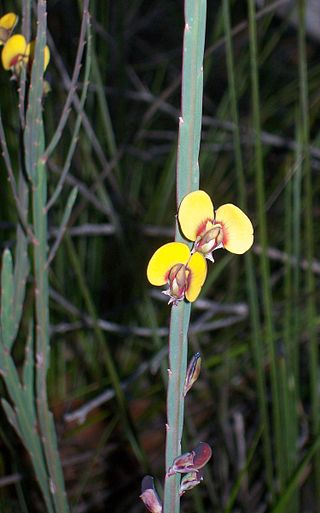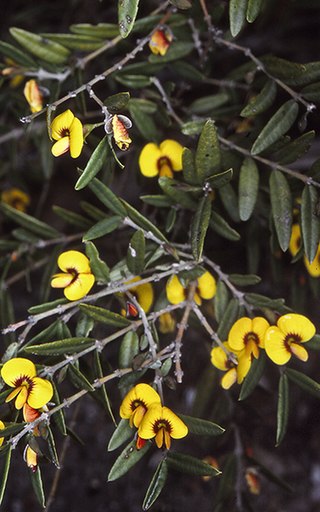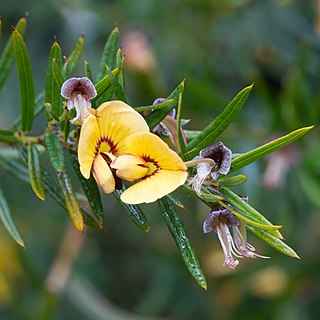
Bossiaea buxifolia, commonly known as matted bossiaea, is a species of flowering plant in the family Fabaceae and is endemic to south-eastern Australia. It is a prostrate to weakly erect shrub with elliptic to egg-shaped or almost round leaves and yellow, red and purplish flowers.

Bossiaea scolopendria, commonly known as plank plant, is a species of flowering plant in the family Fabaceae and is endemic to New South Wales. It is an erect, sparsely-branched shrub with flattened branches, ending in winged cladodes, the leaves mostly reduced to small scales except on the youngest branches, and yellow and red flowers.

Bossiaea cordigera , commonly known as wiry bossiaea, is a species of flowering plant in the family Fabaceae and is endemic to southern Australia. It is a straggling shrub with wiry branches, egg-shaped to more or less heart-shaped leaves and yellow and red flowers.
Bossiaea nummularia is a species of flowering plant in the family Fabaceae and is endemic to New South Wales. It is a prostrate to low-lying sub-shrub with moderately hairy foliage, mostly broadly elliptic leaves, and yellow and red flowers.

Bossiaea arenicola is a species of flowering plant in the family Fabaceae and is endemic to a far north Queensland. It is a shrub or small tree with broadly elliptic to more or less round leaves, and yellow and pale greenish flowers.

Bossiaea stephensonii is a species of flowering plant in the family Fabaceae and is endemic to near-coastal areas of New South Wales. It is a small, weakly erect, multi-stemmed shrub with sharply-pointed, mostly elliptic to egg-shaped leaves, and bright yellow and red flowers.

Bossiaea tasmanica is a species of flowering plant in the family Fabaceae and is endemic to Tasmania. It is a prostrate or low-lying shrub with spiny branches, elliptic to egg-shaped with the narrower end towards the base, and yellow and red to pink flowers.

Bossiaea sericea is a species of flowering plant in the family Fabaceae and is endemic to higher areas of south-eastern continental Australia. It is an erect shrub with more or less round to heart-shaped leaves with the narrower end towards the base, and yellow flowers.

Bossiaea decumbens is a spreading, prostrate shrub in the pea family (Fabaceae), and is endemic to Victoria. It has alternate, variable shaped leaves and yellow pea flowers with red splotches from spring to late summer.

Bossiaea bombayensis, commonly known as bombay bossiaea, is a species of flowering plant in the family Fabaceae and is endemic to a small area of New South Wales. It is an erect shrub with flattened cladodes, small, scale-like leaves, and pea-like yellow to red flowers.

Bossiaea carinalis is a species of flowering plant in the family Fabaceae and is endemic to eastern Queensland. It is an erect shrub with narrow egg-shaped to lance-shaped leaves and pink to red and yellow flowers.

Bossiaea concolor is a species of flowering plant in the family Fabaceae and is endemic to eastern Australia. It is an erect shrub with elliptic to oblong or egg-shaped leaves with the lower end towards the base, and yellow and red flowers.
Bossiaea dasycarpa is a species of flowering plant in the family Fabaceae and is endemic to a small area in eastern Australia. It is a prostrate or low-lying shrub with narrow oblong to narrow elliptic leaves, and yellow and red flowers.
Bossiaea inundata is a species of flowering plant in the family Fabaceae and is endemic to the Murchison River Gorge in Western Australia. It is a spreading, openly-branched shrub with oblong, elliptic or egg-shaped leaves with the narrower end towards the base, and deep yellow and red flowers.

Bossiaea kiamensis is a species of flowering plant in the family Fabaceae and is endemic to the south coast of New South Wales. It is an erect or prostrate shrub with narrow elliptic or narrow oblong leaves and yellow and red to brown flowers.
Bossiaea milesiae is a species of flowering plant in the family Fabaceae and is endemic to a restricted area of New South Wales. It is an erect shrub with flattened, winged cladodes, small, scale-like leaves, and pea-like yellow to apricot-coloured and red flowers.

Bossiaea neoanglica is a species of flowering plant in the family Fabaceae and is endemic to eastern Australia. It is a prostrate to low-lying shrub with sparsely hairy foliage, egg-shaped to more or less round leaves, and yellow and red flowers.
Bossiaea obovata is a species of flowering plant in the family Fabaceae and is endemic to eastern Australia. It is a small, low-lying or prostrate shrub with egg-shaped leaves with the narrower end towards the base, and pea-shaped, yellow and red flowers.

Bossiaea riparia, commonly known as river leafless bossiaea, is a species of flowering plant in the family Fabaceae and is endemic to south-eastern Australia. It is an erect or low-lying shrub with flattened branches, linear young cladodes, leaves mostly reduced to small scales, and yellow and red flowers.

Bossiaea rosmarinifolia, commonly known as Grampians bossiaea, is a species of flowering plant in the family Fabaceae and is endemic to the Grampians in Victoria. It is an erect or spreading shrub with linear leaves and yellow and red flowers.















